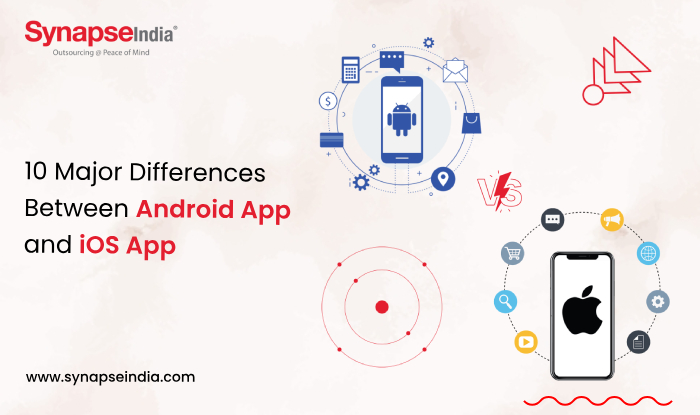 29 Aug 2024
29 Aug 2024“Discover the key differences between iOS and Android app development, from programming languages to design complexity, and choose the right platform for your business needs.”

“iOS and Android apps vary significantly from each other, whether you take user or developer’s point of view. It’s better to know about these differences before creating an application for your business needs.”
iOS and Android apps both have certain similarities and differences, and advantages and disadvantages of their own. For example, both apps are similar in a manner that they can be downloaded from the app shop. However, they are both different in the terms that one can be downloaded from the App store while the other one can be downloaded from Play Store. In this blog, we will focus on 10 major differences between Android apps and iOS apps. We will also discuss the comparison between Android app development services and that of iOS development.

Android applications are created for Android smartphones manufactured by different companies worldwide. iOS applications on the other hand only cater to the devices manufactured by the Apple company. There are a few dissimilarities between both applications which we will check out one by one.
Just as Android apps are different from iOS apps in many aspects, so is their development process. From programming language to development environment, the app building process is distinct for iOS and Android operating systems. Now we will take a look at some of the major differences between Android app and iOS app development.
The programming language used to develop Android and iOS apps are different. iOS applications are created using Swift programming language. For Android operating systems, developers rely on Java or Kotlin for app development.
It is more complex to develop Android applications as compared to iOS apps. The main reason for this being the presence of a wide variety of device manufacturers, models, and screen sizes for Android phones. Smartphone manufacturers around the globe are building devices of different screen sizes, density, and graphics using different versions of the operating system. Due to the availability of different OS versions in Android, device fragmentation is also required for creating apps. Additionally, for different versions, security updates are launched at different times, making the development process even more challenging.
Just like development, the testing of Android apps is also complicated as it involves multiple scenarios to make sure that the app works fine and displays evenly on different devices.
iOS app development is easier because it only involves building apps for a certain device. Apple launches only a limited variation of its products, thus making app creation simpler for developers.
For iOS development, developers use the XCode tool which is made especially to build apps for Apple products. Android Studio is the proprietary tool by Google for Android application development. Both these tools have debugging, and development features suited for the specific operating system.
Android app development requires more time since it needs to be developed to function on different smartphones. It also requires more customization than iOS apps, therefore increasing the development time.
Moreover, less coding is required in Swift as compared to Java or Kotlin which requires complex code for app development. This further increases the time taken to develop Android apps.
For the given reasons, not only the time but the cost involved in building the Android applications increases as well.
Android apps face a higher risk of malware attack given that Android is an open-source platform. In addition to this, Google Play Store slacks a little when it comes to providing secure apps. Some applications available for download on Play Store might be malicious and do more harm than good when installed on your device.
iOS apps are developed with stringent security measures in mind, having strict guidelines for the development ecosystem. Also, the App Store is safer as compared to Play Store.
Although iOS app development is easier than Android development, for reasons such as availability of open-source operating systems, customizability, affordability, accessibility, and market domination, Android applications are more popular among developers.
If you are also looking for app development for your business, you can connect with a prominent Android app development company for your needs. They can build custom mobile apps depending on the nature of your business. This will further enable you to deliver a seamless experience to your customers with apps that can run smoothly across different mobile devices.

Businesses with mobile apps have better chances of reaching their customers, whether they offer products or services. Through mobile apps, you offer round-the-clock availability on the fingertips of your customers. You can even send notifications about any sales or special offers to engage more with them. The actual list of the benefits of having a mobile app is really long. Get an affordable Android app development service now and see the benefits for yourself.


